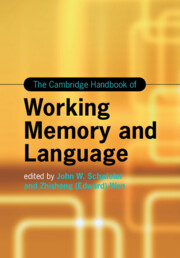Book contents
- The Cambridge Handbook of Working Memory and Language
- Cambridge Handbooks in Language and Linguistics
- The Cambridge Handbook of Working Memory and Language
- Copyright page
- Contents
- Figures
- Tables
- About the Editors
- About the Contributors
- Acknowledgments
- Overview of the Handbook
- Part I Introduction
- Part II Models and Measures
- Part III Linguistic Theories and Frameworks
- Part IV First Language Processing
- Part V Bilingual Acquisition and Processing
- Part VI Language Disorders, Interventions, and Instruction
- 33 Specific Learning Disorders as a Working Memory Deficit
- 34 A New Perspective on the Connection between Memory and Sentence Comprehension in Children with Developmental Language Disorder
- 35 Working Memory and Childhood Deafness
- 36 Working Memory Training in the Classroom
- 37 Working Memory and Classroom Learning
- 38 Cognitive Load Theory and Instructional Design for Language Learning
- 39 Working Memory Training
- Part VII Conclusion
- Index
- References
36 - Working Memory Training in the Classroom
from Part VI - Language Disorders, Interventions, and Instruction
Published online by Cambridge University Press: 08 July 2022
- The Cambridge Handbook of Working Memory and Language
- Cambridge Handbooks in Language and Linguistics
- The Cambridge Handbook of Working Memory and Language
- Copyright page
- Contents
- Figures
- Tables
- About the Editors
- About the Contributors
- Acknowledgments
- Overview of the Handbook
- Part I Introduction
- Part II Models and Measures
- Part III Linguistic Theories and Frameworks
- Part IV First Language Processing
- Part V Bilingual Acquisition and Processing
- Part VI Language Disorders, Interventions, and Instruction
- 33 Specific Learning Disorders as a Working Memory Deficit
- 34 A New Perspective on the Connection between Memory and Sentence Comprehension in Children with Developmental Language Disorder
- 35 Working Memory and Childhood Deafness
- 36 Working Memory Training in the Classroom
- 37 Working Memory and Classroom Learning
- 38 Cognitive Load Theory and Instructional Design for Language Learning
- 39 Working Memory Training
- Part VII Conclusion
- Index
- References
Summary
This chapter reviews research on the efficacy of training Working Memory (WM) in an educational context. We begin with a brief description of WM, its relation to classroom constructs, an overview of WM training programs, followed by classroom recommendations pertaining to several case studies. We characterize WM training programs into two categories: those that are narrow in scope and those that are broad in scope. Narrow-scope WM training programs are similar to a WM test, while broad-scope WM training programs train WM in the context of broader abilities, such as executive function, attention, or learning skills. Additionally, we discuss the efficacy of WM training with respect to near- or far-transfer effects. Near transfer refers to improvements that are similar to the training program, such as improvements in WM tasks, while far-transfer effects refer to improvements in skills related to the area of training, such as other executive function skills such as inhibition, updating, and planning, as well as attention and fluid intelligence (IQ). We also report whether transfer effects are short-lived or long-lasting (maintenance effects). Finally a discussion regarding implementing WM training in the classroom and future directions are provided.
Information
- Type
- Chapter
- Information
- The Cambridge Handbook of Working Memory and Language , pp. 820 - 834Publisher: Cambridge University PressPrint publication year: 2022
References
Accessibility standard: Unknown
Why this information is here
This section outlines the accessibility features of this content - including support for screen readers, full keyboard navigation and high-contrast display options. This may not be relevant for you.Accessibility Information
- 2
- Cited by
